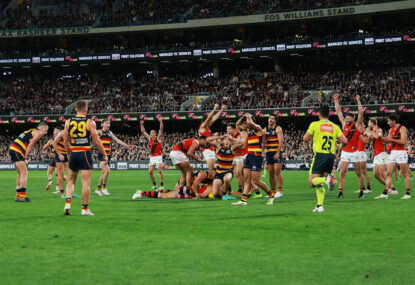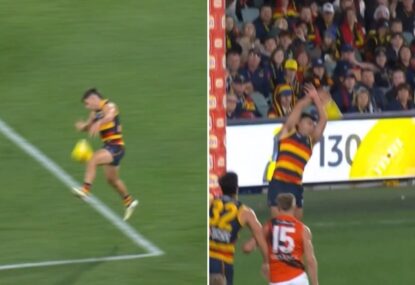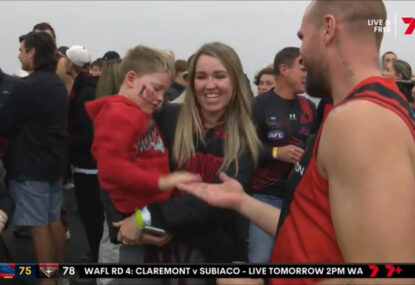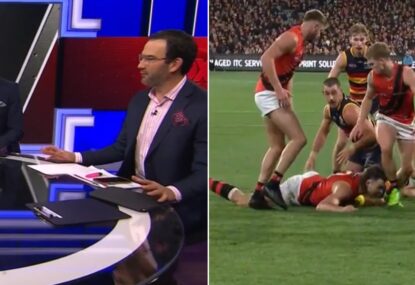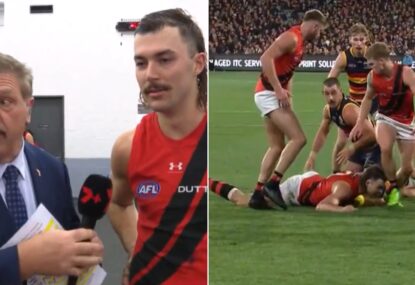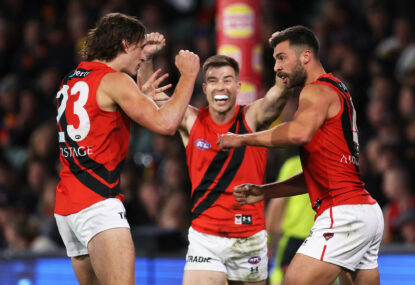Time now for the H team, which combines class and toughness on every line.
Back line
Ross Henshaw (North Melbourne 1971-83)
167 games, 11 goals
Ross Henshaw was a tough and dashing defender for the Kangaroos throughout the 1970s, combining with fullback David Dench to often launch attacks forward. Henshaw played in North’s premiership sides of 1975 and 1977, and despite struggling with injury at times was a reliable team player up until retirement. He held the record for most games played without a Brownlow Medal vote up until 2010, when overtaken by Jason Blake.
Fred Hughson (Fitzroy 1938-47)
164 games, 95 goals
Despite arriving at Fitzroy as a full forward and leading the club’s goal-kicking in his first year, Fred Hughson made his name as one of the best fullbacks of the era. He captained the club from 1943 to 1947 and had finished third in the 1941 Brownlow Medal, but it was as captain-coach in 1944 that Hughson etched his name into club folklore – leading the club to their final premiership before merging with Brisbane 52 years later. A prodigious kick, Hughson once kicked a ball over 80 yards during the halftime break of a match against South Melbourne. He was a popular choice as fullback in Fitzroy’s Team of the Century.
Jack Hamilton (Collingwood 1948-57)
154 games, 16 goals
One of a line of great Collingwood fullbacks, Jack Hamilton was utterly ruthless and one of the first players to start to build a fitness base by lifting weights. Hamilton was a great reader of the game and would often use his pace to affect a spoil of an opposing forward entry. He wasn’t averse to humour in the game either – one time he commiserated with St Kilda’s Milne McCooke after the latter had kicked only two goals. “That’s OK – against the good fullbacks I don’t get anything!” was McCooke’s response. Jack Hamilton went on to be a prominent administrator for the VFL, overseeing the move of South Melbourne to Sydney, and being inducted into the Australian Football Hall of Fame in 1996.
Half back line
Ken Hunter (Carlton 1981-89)
147 games, 160 goals
Ken Hunter was already a star with Claremont in the WAFL before he moved to Carlton in 1981 and promptly won the club best and fairest in a premiership year. He represented Western Australia on ten occasions as well as playing in VFL premierships in 1981, 1982, and 1987. Hunter was renowned for his courage, flinging his body in with no regard for safety – best exemplified when he won the Mark of the Year in 1983 with a twisting leap to meet the ball and oncoming pack together. Injuries dulled the last few years of his career, but he had been effective enough to earn a place on the bench in Carlton’s Team of the Century.
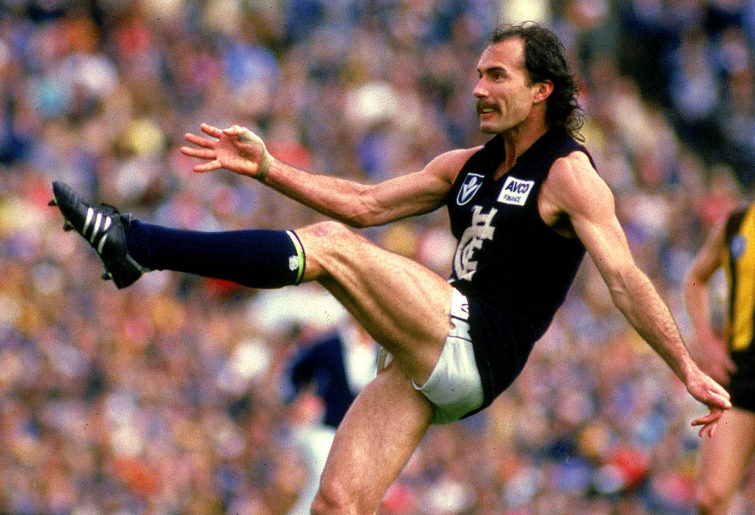
(Photo by Getty Images)
Reg Hickey (Geelong 1926-40)
245 games, 24 goals
One of the most revered names in Geelong history, Reg Hickey is the only person to win premierships as captain (1931), captain-coach (1937) and non-playing coach (1951-52). Playing in the back half, Hickey was tough but fair, able to adapt to weather conditions and use both sides of his body well, while he made many telling dashes from defence to set up forward movements. He won best and fairest awards in 1928 and 1934, also representing Victoria on 18 occasions. Hickey retired as Geelong’s games record-holder, and was a natural choice as centre half back in the club’s Team of the Century.
Ben Hart (Adelaide 1992-2006)
311 games, 45 goals
Ben Hart’s first season in the AFL ended in All Australian selection, as did his second. Two more selections would follow in 1999 and 2002, while he won best and fairest awards in those two years. After some time operating as a wingman, Hart found his role as a cool, composed and skillful defender who would unerringly find teammates to push forward. The first Adelaide Crow to play in 300 games, Hart played in both premierships of 1997 and 1998, and won the Mark of the Year in 1996. He has moved into coaching after his playing career ended.
Centre line
John Hendrie (Hawthorn 1972-82)
197 games, 254 goals
For much of the 1970s, John Hendrie was a hard runner with a sweeping kick that could take a good mark and impact the scoreboard. He played in Hawthorn’s 1976 and 1978 premierships, kicking 2.8 in the earlier grand final. Hendrie represented Victoria in 1977 and 1978, and retired after form deserted him and coach Allan Jeans advised him to leave the game as a one-club player.
Robert Harvey (St Kilda 1988-2008)
383 games, 215 goals
Robert Harvey could run all day – and often did. As the first player to play in 21 consecutive seasons, he was never the flashiest player on the field, but unfailingly effective at finding the ball and disposing of it well. Harvey was named All Australian on eight occasions, won four best and fairest awards, two Brownlow Medals in consecutive years, and was named as ruck-rover in St Kilda’s Team of the Century. As a regular representative in Victorian sides of the 1990s, he won three EJ Whitten Medals as best on ground for Victoria. When he retired, he was the only player to have polled Brownlow votes in over 100 games.
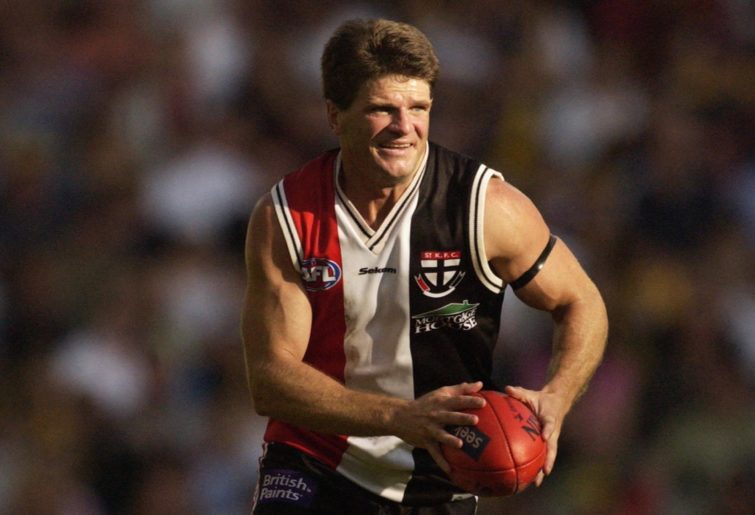
(Robert Cianflone/Getty Images)
Doug Hawkins (Footscray 1978-94, Fitzroy 1995)
350 games, 227 goals
Doug Hawkins is arguably the most popular Bulldog of all time. After all, not many people get a part of the ground named after them – the Doug Hawkins Wing was synonymous with Western Oval. Blessed with all the skills and plenty of courage, he was considered one of the most naturally gifted footballers of the era. Hawkins was able to win the ball in virtually any situation and was expert in making the sublime look simple. Winning a club best and fairest award in 1985, he also led the club goal-kicking in 1991 and was named as captain from 1990 to 1993. After his contract was not renewed in 1994, Hawkins crossed to Fitzroy to assist the club in its final years. Hawkins was named on the wing of Footscray’s Team of the Century.
Ruck line
Les Hughes (Collingwood 1908-22)
225 games, 175 goals
Known as ‘Flapper’, Les Hughes was the first of a multitude of great Collingwood ruckmen. Hughes was able to use his great reach to strong effect against taller men, and was often featured in the best players list of finals matches during his career. Hughes played in the 1910, 1917 and 1919 premierships, and represented Victoria in three years. While his kicking was seen as a weakness, Hughes was able to lead Collingwood’s goal-kicking in 1912 and 1913, and had enough stamina to ruck all day. In 2009, Hughes was inducted into Collingwood’s Hall of Fame.
Luke Hodge (Hawthorn 2002-17, Brisbane 2018-19)
346 games, 194 goals
One of the towering figures of the past two decades, Luke Hodge had a slow start to his career and copped some unflattering comparisons with Chris Judd, who had been drafted just after him. In 2005, he hit his straps and was named as All Australian for the first time, also winning his first club best and fairest award – a second would follow in 2010. Playing in the midfield or at half back, Hodge was courageous and would lead by example at all times on the field. He captained Hawthorn’s three-peat of premierships from 2013-15 as well as playing in the 2008 flag, winning Norm Smith Medals in 2008 and 2014. After retiring from Hawthorn, he moved up to Brisbane and lent his experience to the young team, helping them reach the finals in 2019.
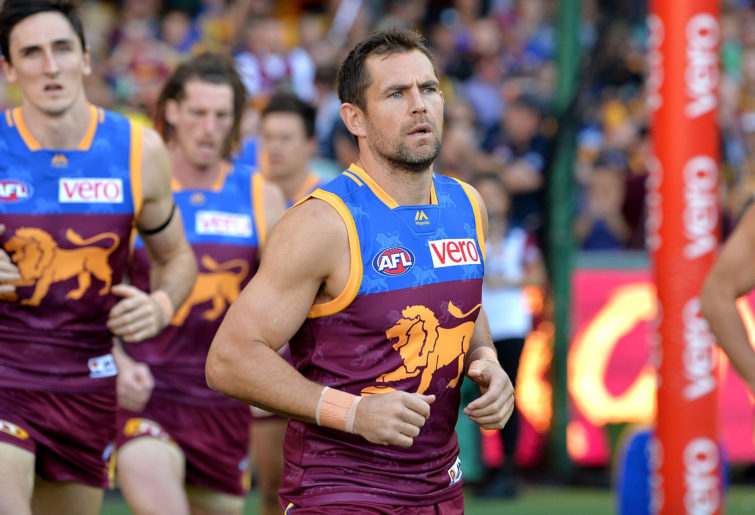
(Photo by Bradley Kanaris/Getty Images)
Bill Hutchison (Essendon 1942-57)
290 games, 496 goals
Bill Hutchison was recruited from a local team as a wingman/flanker, where he would play in the 1942 premiership in his debut year. However, it was as a rover that Hutchison would make his name, with great pace and stamina enabling him to run all day and bob up for a few handy goals in most matches. Hutchison would win seven best and fairest awards in his career, as well as Brownlow Medals in 1952 and 1953. In 1948, he led the club goal-kicking, and he also played in the premiership years of 1946, 1949 and 1950. From 1951 to retirement he captained Essendon, hanging up the boots after the Bombers lost the 1957 grand final. He was inducted as an official Hall of Fame Legend in 2003, was named as the fourth greatest Essendon player ever in 2002, and is a forward pocket in their Team of the Century.
Half forward line
James Hird (Essendon 1992-2007)
253 games, 343 goals
The man who sits just ahead of Bill Hutchison in the Champions of Essendon list, number three James Hird was a third generation Bomber after his grandfather Allan (a 1942 premiership player) and father Allan Jnr both played for the club. Unflinchingly courageous and able to impose his will on a contest from any position, Hird started his career slowly before starting to shine as part of the Baby Bombers of 1993. The first of five club best and fairest awards followed in 1994, and he led Essendon’s goal-kicking in 1995 and 1996 – winning a Brownlow Medal in the latter year. Hird captained Essendon from 1998 to 2005, including the fabled 2000 season where he won the Norm Smith Medal. He was named All Australian on five occasions, and is named on the half forward flank of Essendon’s Team of the Century.
Royce Hart (Richmond 1967-77)
187 games, 369 goals
Royce Hart courted controversy in 1970 when, in an autobiography, he named himself at centre half forward of a team of best players. That he would go on to be named at centre half forward in the official VFL/AFL Team of the Century (plus Richmond’s own Team of the Century) would bear that out to be not without foundation. Hart played in Richmond’s premiership sides of 1967, 1969, 1973 and 1974 – taking a mark over Ken Newland in 1967 that would go down in VFL folklore – and led the club’s goal-kicking in 1967 and 1971. Throughout his career, Hart would be consistently one of the best players on the field, with strong marking ability, deft skill, and inspirational leadership. He captained Richmond from 1972 to 1975, stepping down once injuries started to bother him more and more, finally retiring in 1977. Hart was named an official Hall of Fame Legend in 2013.
Brent Harvey (North Melbourne 1996-2016)
432 games, 518 goals
Even in his 21st year, Brent Harvey was consistently among North Melbourne’s top performers, running hard, delivering the ball with precision and kicking a timely goal. However, his contract was not renewed and he chose to retire as the all-time AFL games record-holder rather than pull on another team’s jumper. Harvey played over 20 games in all but four seasons of his career and won five best and fairest awards during his career. He played in the club’s 1999 premiership, and in the same year won the last Whitten Medal for best on field in a State of Origin match. Harvey captained North from 2009-11 and was named on the interchange bench of North Melbourne’s Team of the Century.
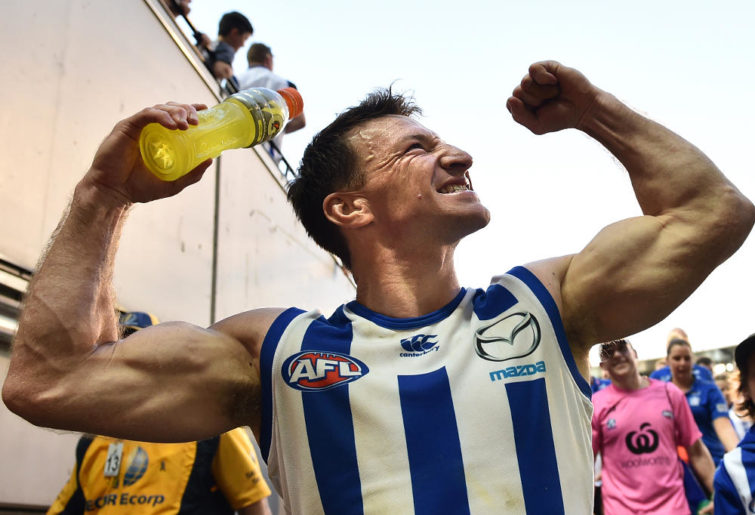
(AAP Image/Julian Smith)
Forward line
Barry Hall (St Kilda 1996-2001, Sydney 2002-09, Western Bulldogs 2010-11)
289 games, 746 goals
Although the first six years of his career were spent at St Kilda and his final two as a Bulldog, it is as a Swan that Barry Hall will be best remembered. At St Kilda, Hall announced himself with a three-goal burst in the 1997 grand final and led the club goal-kicking in 1999 and 2001, but several undisciplined acts and the recruitment of the likes of Nick Riewoldt and Justin Koschitzke saw him depart the club for Sydney, becoming the Swans’ first real post-Tony Lockett spearhead. Hall won Sydney’s goal-kicking for the first seven years he was at the club and played in the 2005 premiership, despite again featuring in some unsavoury incidents – most notably knocking out Brent Staker in 2008. Sydney traded Hall to the Bulldogs after their patience ran out in 2009, and Hall would lead the Bulldogs’ goal-kicking in both years at the club. He became the first player to kick 100 goals for three different clubs.
Peter Hudson (Hawthorn 1967-74, 1977)
129 games, 727 goals
Peter Hudson owns the record for most goals per game in VFL/AFL history. An intelligent full forward who would position himself well to snaffle the ball and kick yet another goal, Hudson led Hawthorn’s goal-kicking in each of his first five years as a Hawk. In 1972 he kicked eight goals to halftime in Round 1 before badly damaging his knee, in 1973 he took a helicopter to VFL Park to kick eight goals in his only match for the year, and in 1974 he played the first two matches before returning to Tasmania, being lured back for one last tilt in 1977. In his six full seasons, Hudson kicked over 100 goals five times. In 1971, he matched Bob Pratt’s record of 150 goals in a season, but his attempts to kick goal 151 verged on the comical (kicking into the man on the mark, having a goal disallowed as the umpire had blown time on, and out on the full from 30 metres out). He won Hawthorn’s best and fairest award twice, and was named at full forward in their team of the century.
Dick Harris (Richmond 1934-44)
196 games, 548 goals
Dick Harris was a clever and creative rover for Richmond, able to run forward and kick a handy goal while also delivering the ball forward with great accuracy. He played in Richmond’s 1934 and 1943 premierships, being named best on ground in the latter grand final after kicking seven goals. Harris led Richmond’s goal-kicking on three occasions and led the league in the 1943 flag year. After the 1944 season, he moved to Williamstown in the VFA and won the 1945 premiership. In 1964, he stood in as coach for Richmond for six games after Len Smith suffered a heart attack.
Interchange
Lenny Hayes (St Kilda 1999-2014)
297 games, 95 goals
Lenny Hayes was a dependable and consistent midfielder for St Kilda over 16 years, rarely lowering his colours during a match. He was noted for his ferocious tackling, retiring as the record-holder for tackles until overtaken in 2017. Hayes won St Kilda’s best and fairest award on three occasions, was named All Australian four times, and for the bounce of a ball, would have been a Norm Smith Medal winner in a premiership year. He was inducted into the Australian Football Hall of Fame earlier this year.
Charlie Hammond (Carlton 1905-09, 1914-18)
154 games, 40 goals
Before his club, Northcote, joined the VFA, Charlie Hammond was a star defender before being recruited by coach Jack Worrall to play for Carlton. Hammond was a feature in the club’s hat trick of premierships, firstly as a hard-hitting defender in 1906 before developing into one of the finest rucks in the competition. In 1910, he was one of several Blues who left the club in support of coach Worrall, and after some time back with Northcote was lured back to take part in Carlton’s 1914 and 1915 flags, making him the only Carlton player to have played in five premierships. Hammond inducted into Carlton’s Hall of Fame in 1991
Ken Hands (Carlton 1945-57)
211 games, 188 goals
In only his 18th game of VFL football, Ken Hands was a focal point of Carlton’s attack in one of the most famous grand finals of all time. Knocked out in the second quarter of the Bloodbath of 1945, he recovered to kick three crucial goals and win a flag in his first year. For the following 12 years, Hands was a dependable ruckman or key position player, whose leadership was greatly valued inside and outside the club. He represented Victoria on 12 occasions, captained Carlton from 1952-57 and won a best and fairest in 1953. His career ended among bitter recriminations with former best mate Jim Francis, and he replaced the latter as coach from 1959-64 before being pushed out by the arrival of Ron Barassi. Hands was named in the forward pocket of Carlton’s Team of the Century, and was inducted into the VFL/AFL Hall of Fame in 2009.
Allan Hopkins (Footscray 1925-34)
151 games, 205 goals
Allan Hopkins was noted for his ungainly running style, but it didn’t stand in the way of his being one of the most effective centremen of his era. A near ever-present in Victorian squads of the time, he won the Brownlow Medal in 1930 – the same year in which he served as captain-coach. Winning a best and fairest award in 1931, Hopkins left to move down the road to Yarraville in the VFA, and assisted them in winning a premiership in 1935. He led Footscray’s goal-kicking in their first two years in the VFL, and was an inaugural inductee into the VFL/AFL Hall of Fame. Hopkins was named as centreman in Footscray’s Team of the Century and is an official club legend.
Emergencies
Tom Hawkins (2007-)
258 games, 556 goals
After his first game, Carlton coach Denis Pagan compared Tom Hawkins with all-time leading goal-kicker Tony Lockett. While he has not quite reached those heights, Hawkins has been a powerful forward and focal point for Geelong since his debut. In his first few years, he was inconsistent and occasionally struggled for fitness. A breakout performance in the 2011 grand final – his second premiership – led to a streak of seasons where his marking, physicality and accurate kicking would see him lead Geelong’s goal-kicking in every year from 2012 onwards, also winning a best and fairest in 2012. With footy returning, Hawkins looms as an important part of Geelong’s premiership puzzle.
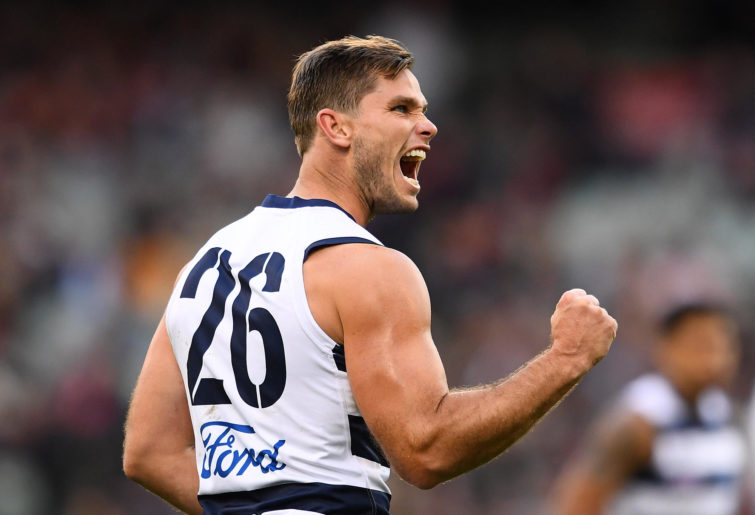
(Photo by Quinn Rooney/Getty Images)
Garry Hocking (Geelong 1987-2001)
274 games, 243 goals
Garry Hocking owns two of the most distinctive nicknames of the 1990s – ‘Buddha’, owing to his stocky build, and ‘Whiskas’, when he took on a name change to bring some money into his beloved Geelong club. A powerful midfielder who regularly represented Victoria in State of Origin matches, Hocking played in all four of Geelong’s losing grand finals during his career, and won club best and fairests on four occasions. His stature at the club was such that he was named as ruck rover in Geelong’s Team of the Century upon his retirement in 2001.
Gerard Healy (Melbourne 1979-85, Sydney 1986-90)
211 games, 276 goals
With superb ball skills and a knack for being at the fall of the ball, Gerard Healy was a star for Melbourne during an unsuccessful era for the club, leading their goal-kicking in 1982 and winning a best and fairest in 1984. Once he crossed to Sydney he took his game to another level, winning three straight best and fairest awards as well as a Brownlow Medal in 1988. Injuries marred his last two years with the Swans, and although Collingwood drafted him in 1991, he never kitted up for them. Healy was named on the half forward flank in Sydney’s Team of the Century, and is now a prominent commentator.
Honourable mention
Bert Hurrey (University 1908-13)
101 games, 29 goals
By no means was Bert Hurrey a legend of the game, but he was a versatile midfielder who was seen as one of the finest in the league at his peak in 1912. I have chosen to devote a little time to mention him as he holds an unbeatable record as the only player to reach 100 games in University’s short-lived tenure in the VFL. He is probably only rivalled by Roy Park as the best player in the club’s history.
Next will be the J team, as the letter I does not have enough for a standout team of their own.


































































































